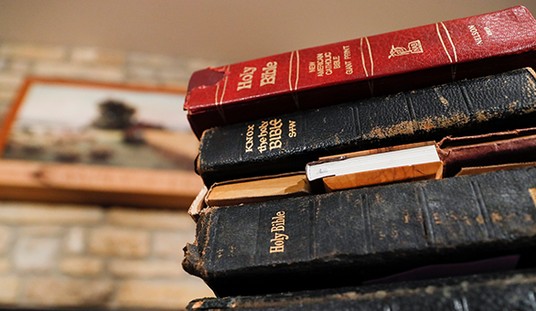[jwplayer config=”pjmedia_eddriscoll” mediaid=”65626″ width=”590″ height=”360″]
In May of 2013, John O’Sullivan, former editor of National Review offered a unique take on the subtext of Tom Wolfe’s then new book, Back to Blood. It seems remarkably prescient in light of how the media just spent the week leading up to Good Friday, Passover, and Easter attempting to destroy an Indiana pizza parlor and other religiously faithful small businesses. I’m reprinting the post I wrote in July, which features the relevant quote from O’Sullivan and Wolfe’s response when Peter Robinson asks him about it during his video interview as part of Robinson’s long-running Uncommon Knowledge series:
Ricochet’s Peter Robinson begins his new interview with Wolfe by reading from the central leitmotif of Wolfe’s latest book, Back to Blood:
A phrase pops into his head from out of nowhere. “Everybody… all of them… it’s back to blood! Religion is dying… but everybody still has to believe in something. It would be intolerable— you couldn’t stand it— to finally have to say to yourself, ‘Why keep pretending? I’m nothing but a random atom inside a supercollider known as the universe.’ But believing in by definition means blindly, irrationally, doesn’t it. So, my people, that leaves only our blood, the bloodlines that course through our very bodies, to unite us. ‘La Raza!’ as the Puerto Ricans cry out. ‘The Race!’ cries the whole world. All people, all people everywhere, have but one last thing on their minds— Back to blood!” All people, everywhere, you have no choice but— Back to blood!
Beyond Wolfe’s own introduction, I thought John O’Sullivan had one of the best takes on Wolfe’s new book, (hidden behind the National Review subscriber paywall, alas) describing it as a battlefront report on the warring “Tribes of Post-America:”
Wolfe’s vision of the America emerging from the chaos of modernity is eerily similar to the Rome of Antiquity before Constantine. Where that antiquity was pre-Christian, this New Antiquity is post-Christian. Its original brand of Protestant Christianity no longer influences the politics, institutions, and laws of the nation it once shaped. The WASP elites, for whom Protestantism was long a mark of respectability and soundness, no longer even pretend to believe. It is a genuine religious faith for only a tiny number of people. Its secular expressions, “American exceptionalism” and “the American Creed,” are in only slightly better shape. The former provoked President Obama into an embarrassed meandering as he sought to reconcile his cosmopolitan disdain for it with its popularity among the rubes; the latter has been redefined into its opposite, an umbrella term covering a multitude of tribes and their different customs, namely multiculturalism.
This transformation from the Great Republic to the New Antiquity has happened in large measure in order to accommodate the growing number of immigrant groups forcing their way into the metropolis. It is a colder and crueler world: Inside the cultural ghettos, the new tribes of post-America retain much of their old affections and loyalties; outside them, they treat others with wariness and distrust. And they are slow to develop a common attachment to their new “home.”
“As mainline WASP Christianity shrivels,”O’Sullivan writes, “other cults flourish in its place: the ethnicity cult, of course; the arts cult for the very rich; the sex cult for the young; the celebrity cult for professionals; the psychology cult for billionaire clients; a religion cult (non-traditional religion, of course) for the perplexed; and the cult of wealth for everyone. Only the Gods of the Copybook Headings are missing from this teeming agora through which Wolfe’s characters pursue their fantasies and flee from their anxieties.”
Robinson asks Wolfe about this passage. Also in the interview he asks Wolfe about his process as a writer (which he cranks out on a manual typewriter or even a pencil, considering how difficult it is for him to keep a typewriter in proper repair), and the importance of taking notes and jotting down ideas as quickly as possible while in the field reporting, before the brain’s memory decay erases the tiny details of a scene that adds verisimilitude to his writing.
Needless to say, watch the whole thing. O’Sullivan’s speech to the Transatlantic Christian Council in Brussels in 2013 on “Our Post-Christian Society” is also prescient (and to the best of my knowledge, not behind the NRO paywall):
How can Christians best resist this aggressively secularist movement? How can we best understand its driving force and character? Answering those linked questions is the task of this conference. But I want to suggest two lines of approach.
The first is that we should seek support from a different sort of secular mind. Recent years have seen the rise of those who call themselves “Catholic atheists” or “Christian atheists.” Oriana Fallaci was one such. These are people who, though not able to believe in the God of the Christian religion, nonetheless love the society that Christianity created, recognize its worth, and wish to protect it. They are — so to speak — patriots of the post-Christian society. Kenneth Minogue, who died a few months ago, gave one of the most perceptive arguments from this standpoint in his essay “‘Christophobia’ and the West,” published in The New Criterion. He there described how the secularized idealism that broke free of Christianity has now turned against its parent. It has evolved into a proselytizing secularism that seeks to banish religion from public life altogether. It is, in effect, an ersatz religion that competes with Christianity in offering a rival “vision of human betterment to be achieved on a global scale by forging the peoples of the world into a single community based on the universal enjoyment of appropriate human rights.”
Because different religions rarely get on — and because the secularist version of appropriate human rights differs sharply from Christianity’s — this Christophobic secularism increasingly seeks to uproot what remains of Christian tradition from national law and custom within Western countries. Thus, a Christian dating agency in California was sued successfully because it would not match up same-sex couples; Catholic adoption agencies in Britain must now either refer children to same-sex couples or close down; Christian pastors on both sides of the Atlantic have been prohibited from preaching sermons on certain topics. And so on, and so forth. In resisting such attacks, we should seek out allies among “Christian atheists” and promote their arguments. They are fighting for half the truth — for what we might call a genuine social gospel — and we should be grateful for their aid. If all of them are as clever, brave, and principled as Oriana Fallaci and Ken Minogue, we will have recruited powerful intellectual auxiliaries.
And to return to April of 2015, the New York Times sends its warmest Easter wishes to the faithful:
Christians ‘Must Be Made’ to Bow | The American Conservative – http://t.co/NPbx5CB8Rf
— John Podhoretz (@jpodhoretz) April 4, 2015










Join the conversation as a VIP Member